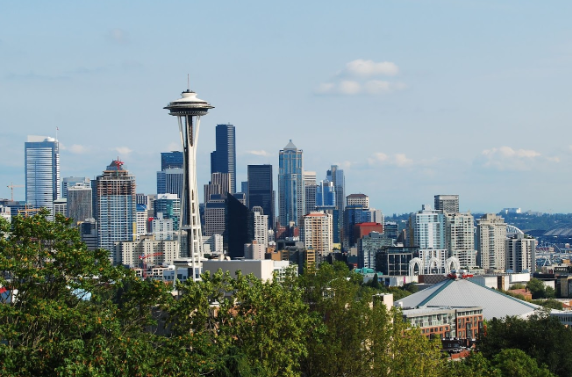Sustainable Seattle for eco-conscious travelers

With forests, mountains, and Puget Sound on the doorstep, Seattle is a city built around nature.
The city’s first nature-inspired hotel opened on Earth Day (April 22), and is perfect for travelers seeking a sustainable escape.
From 489 parks and miles of trails to nearby Mount Rainier and Bainbridge Island, Seattle blends green living with wild adventure.
Eco meets luxury at 1 Hotel Seattle
Seattle isn’t short of sustainable stays that allow guests to reducie their environmental impact. 1 Hotel Seattle, the city’s first nature-inspired luxury hotel has opened. The hotel has a LEED silver certification and 75% of construction waste was diverted from landfill, while 90% of food waste and packaging is either composted or recycled. The hotel’s eco-conscious ethos is evident in its design, featuring reclaimed wood finishes, stone-clad millwork and moss-inspired art that reflects the natural beauty of the Pacific Northwest. The comfortable rooms provide the perfect place to unwind after a day of sightseeing, with large soaking tubs, yoga mats and organic mattresses. The house car – a fully electric Audi Q8 e-tron—can ferry guests to nearby landmarks like Pike Place Market, the Space Needle and the city’s iconic waterfront.
Sleep green at any of the following Seattle hotels:
The Hyatt Regency Seattle was the first Seattle hotel to achieve LEED Gold Certification.
Hyatt at Olive 8 became Seattle’s first LEED Silver-certified hotel in 2009 and features a green roof and energy-efficient fixtures.
citizenM hotel in South Lake Union and Pioneer Square is Seattle’s first-ever fully modular hotel and is designed to achieve LEED Gold certification. The hotel saves 29% in energy usage and uses solar panels.
Sheraton Grand Seattle was the first hotel in the nation to launch a “green room” program where guests are rewarded for reducing towel and linen replacement during their stay.
W Seattle is Green Seal-certified based on its waste minimization, water and energy efficiency, and hazardous substance handling.
Seattle sets the standard
Seattle is leading the way in urban ecological restoration and has been recognized as a “Role Model City” by the United Nations. Integrating sustainability into its identity, Seattle leverages maritime science and tech innovations to lead climate action. The city is the only U.S. participant in the United Nations’ Generation Restoration Program, focusing on urban forest restoration and ecosystem health across nearly 500 parks. The initiative has resulted in the planting of over four million native plants, making Seattle a hub for recreational green spaces.
The Emerald City powers ahead
Seattle generates 90% of its electricity from hydroelectric power, making it the first U.S. city with a carbon-neutral utility. Over 200 parks are designated Salmon-Safe, ensuring clean waterways, while all city-owned buildings will run on renewable energy by 2035. The city has led in plastic waste reduction, banning plastic bags (2011) and single-use plastic straws (2018). Composting is legally required for households and businesses, contributing to a waste diversion rate of over 60%, nearly double the national average.
Shell Yeah!
From responsibly sourced seafood to the world’s first certified sustainable sushi restaurant, Seattle is a must for foodies seeking the best farm-to-table produce while supporting sustainable practices. Seattle is renowned for its fresh seafood. Stop by one of Taylor Shellfish’s legendary oyster bars. As a fifth-generation, family-owned business, they are the largest producer of farmed shellfish in the U.S., offering oysters, clams, mussels, and geoduck harvested from their own sustainable farms. Bamboo Sushi — located in University Village, a popular hangout for students — serves the freshest sushi in town. The restaurant also donates a portion of its sales to nonprofits that work to preserve and restore fisheries, watersheds, and ecosystems.
Green transportation
Seattle leads in sustainable travel, with Seattle-Tacoma International Airport (SEA) the first North American airport to be carbon-certified and it aims to power all flights with sustainable fuel by 2028. The airport has also committed to using only reusable or compostable packaging and targeting 60% waste diversion. The Port of Seattle is working toward full decarbonization, requiring all homeported vessels to use shore power by 2027 and has launched a Green Corridor initiative with Alaskan and Canadian partners. On land, the city is transitioning public transport to 100% renewable energy by 2035, electrifying its rideshare fleet by 2030, and expanding bike lanes and shared mobility options.
Related News Stories: News Archive - Page 4939 of 9444 - TravelMole BA unveils upgraded Seattle airport lounge News Archive - Page 4899 of 9445 - TravelMole FAA probing Seattle Airport ground collision HAL takes Alaska expo to San Diego 10 reasons to add Slovenia to your travel list in 2024 - TravelMole HAL releases 2026 2027 Mexico and Pacific Coast cruises Second new Boeing plane sent back from China Ambassador Cruise Line bowled over by Cricket - TravelMole VisitEngland announces venue and date of Awards for Excellence ...
TravelMole Editorial Team
Editor for TravelMole North America and Asia pacific regions. Ray is a highly experienced (15+ years) skilled journalist and editor predominantly in travel, hospitality and lifestyle working with a huge number of major market-leading brands. He has also cover in-depth news, interviews and features in general business, finance, tech and geopolitical issues for a select few major news outlets and publishers.
 United Kingdom
United Kingdom United States
United States Asia Pacific
Asia Pacific












































Royal Caribbean issues Legionnaires’ disease warning
Qatar Airways adding Manchester flights
Jet2 unveils Samos as new Greek destination for summer 2026
EU entry-exit system delayed again
ATC strike in Greece could disrupt flights this week